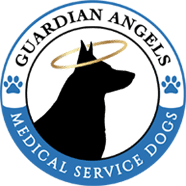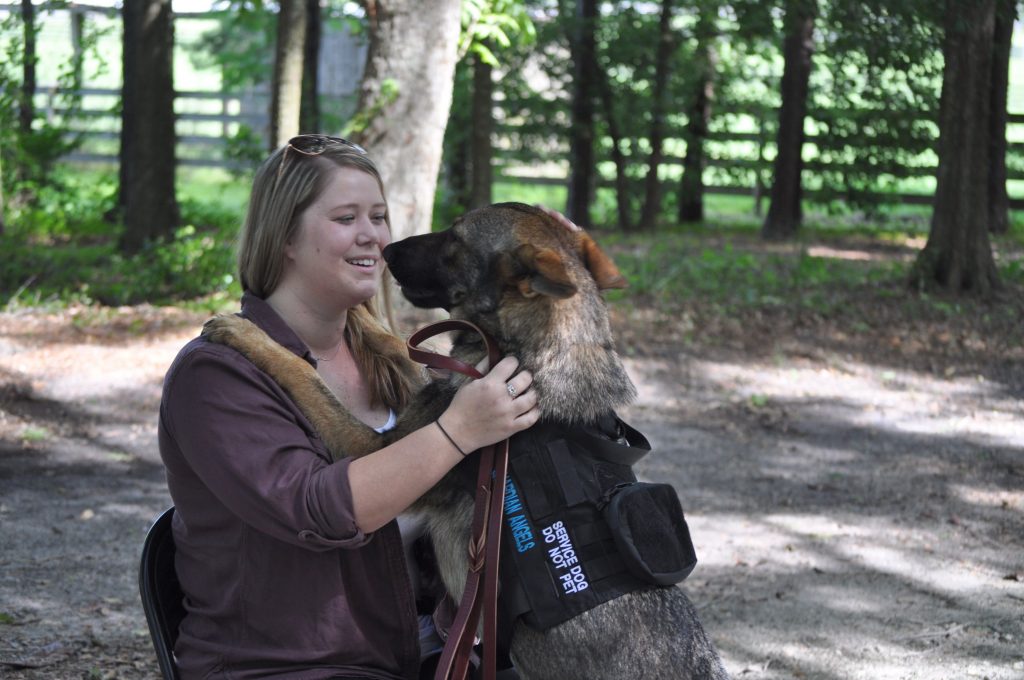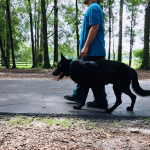At Guardian Angels Medical Service Dogs, we rescue, raise, train, donate and pair service dogs for individuals who have permanent disabilities. A disability is defined by law as a physical or mental impairment that substantially limits one or more major life activity.
Service dogs can be trained to alert to seizures, manage the symptoms of PTSD, assist with mobility, diabetic alerts, seizures, and so much more. With their obedient and intelligent natures, dogs can assist their recipient with a wide range of tasks tailored to the needs of their recipient through our extensive training.
What Do Service Dogs Do?
All of our service dogs are custom trained to meet the needs of their recipient. They can assist with a large range of tasks, including but not limited to:
- Retrieving dropped items, assisting with balance, opening/closing doors or drawers, turning on/off lights, hitting door or elevator buttons, etc.
- Redirecting and calming the recipient during anxiety/panic attacks, night terrors or flashbacks.
- Alerting in advance to seizures
- Alerting to diabetic changes
- And more
Each recipient is evaluated by our team, and the service dog receives special training specifically tailored to mitigate the challenges of the recipient’s disability.
How Do You Qualify for a Service Dog Through Guardian Angels?
First, you must be cognitively, physically, and financially capable of going through our 10-day pairing process and be solely responsible for the care and handling of your service dog for the future of your relationship. Our dogs require certain communication, exercise, and care, which are all important elements of a successful relationship between the service dog and the recipient. The recipient is expected to be 50% of the team’s success.
If someone is not cognitively capable of going through our training or does not have the physical capabilities to provide the dog with all his/her care, handling and playtime, a service dog may not be the right answer. This does not necessarily exclude people with brain injuries or those who use a wheelchair from getting a service dog. We review each case individually and determine their level of ability to care for and work with their service dog.
Secondly, we have expectations of the individual to provide the service dog with the premium diet and medical care we require. We also expect them to be able to provide their service dog with toys and anything else he/she would require. The recipient must have the expendable income to care for their service dog.
Once we get beyond these variables and the individual has qualified on these points, we will evaluate them to make sure they are in a stable living environment. Our recipients cannot, for example, be homeless. They must have a stable housing situation that is conducive to them providing the proper environment for their service dog. Additionally, recipients must be free of addiction issues.
If the recipient is a single individual, they cannot have other dogs in the home. However, if the recipient is in a family situation, we may make allowances for other dogs in the home. This is because the recipient’s sole responsibility should be to care for their service dog while the family cares for the other pets in the home.
The Process of Pairing the Dog with the Individual
At Guardian Angels Medical Service Dogs, we know our dogs very well after training them for 1 1/2 to 2 years. We understand their level of drive, whether they would cohabitate well with other dogs or cats, whether they are more laid back or high energy, etc. We consider these factors about each service dog while we get to know our potential recipients. We learn about the recipient’s job, family situation, activity level, hobbies, and more to help ensure that we pair them with a service dog that best matches their lifestyle and needs. These factors all play a role in which service dog we choose to mitigate the issues for that individual. We go through a variety of variables to figure out what dog will be most suitable for the recipient before we do the final training.
Want to Learn More About Applying for A Service Dog? Contact us Today!
If you have any questions about qualifying for a service, please contact our team today or visit our website, go to the Applications tab and then go to Service Dog Application for more information.
- How to Take Advantage of the CTU Patriot Scholarship - April 5, 2024
- Benefits of Service Dogs for Veterans - April 3, 2024
- The Art of Matching: How We Pair Service Dogs - March 19, 2024





